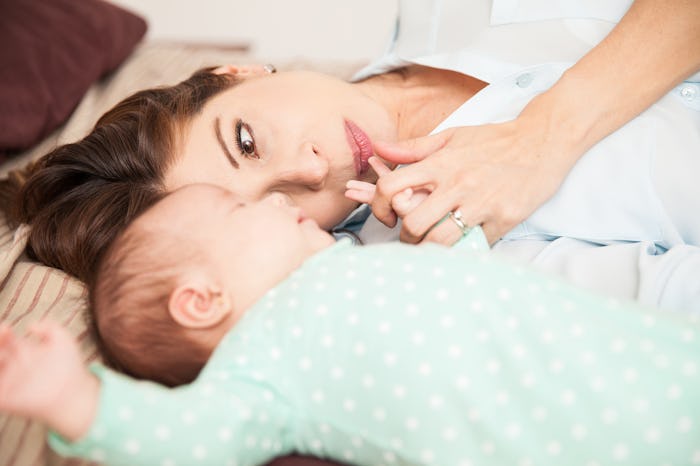Life

9 Bed-Sharing Risks You May Not Be Aware Of
For some parents, the decision to sleep in the same bed as their infant comes from a belief in a specific parenting style. For others, it may be less about a choice and more about convenience, trying to get sleep, or keeping up a family tradition. Whatever the reason may be, there are some surprising bed-sharing risks you may not be aware of and should definitely know about. Though it seems there are very few things, if any, that experts, doctors, or even parents can universally agree on when it comes to knowing what the "right" choices are for child-rearing. In fact, people may never fully agree and opinions will probably be constantly evolving and changing.
In spite of all this, there do appear to be several potential hazards in regards to sharing a family bed that are echoed by many in the scientific and medical community. With that being said, just because there is a chance something could go wrong doesn't necessarily mean you can never share your bed. It could be as simple as making a few changes to your routine to avoid problematic scenarios. Whichever conclusion you may draw, it all begins with arming yourself with knowledge. Check out these bed-sharing risks you may not have even known existed.
1The Chance Of SIDS Increases
Nobody likes to talk about Sudden Infant Death Syndrome (SIDS), but it's a worry that lurks in the back of every parent's mind. The Center for Disease Control and Prevention (CDC) recently released a report which stated that even, "when the parents do not smoke, take alcohol or drugs, bed sharing for sleep increases the risk of SIDS." To break it down by numbers, 22 percent of the SIDS cases studied occurred in a bed-sharing environment. In contrast, only 0.23 instances happened with room-sharing, where the child and parent are in the same room but not the same bed.
2They Can Become Caught
Whether you're a heavy or light sleeper, your child can find themselves in a precarious situation while either of you are asleep. According to The March of Dimes, top risks of bed-sharing include, "getting stuck between the bed and the wall, the bed furniture, or other objects." Your child will probably alert you once they realize they are caught, but it may be especially dangerous if they are under a year old.
3You're Less Likely To Remove Objects
Most people know that a baby is supposed to sleep in their crib without blankets, toys, or non-breathable bumper pads near their face. However, when a parent and child sleep on the same surface, it may be more difficult to monitor or maintain the environment. Dr. Rachel Moon, a SIDS researcher at Children’s National Health Hospital, told The Huffington Post, "though [it's] recommended that the infant’s sleep area be clear, many parents forget the importance of this message when bed-sharing."
4The Risk Of An Accident Rises
Even if you think you have kept the sleeping environment clear of suffocation hazards, there could still be a possibility of injury. According to the American Academy of Pediatrics, bed-sharing increases the risk of accidents and injuries in children and the chances are higher the younger the child is. Falling of the bed or having an object fall or a parent roll over on them are all possible scenarios that could occur during bed-sharing.
5They May Have Difficulty Sleeping
As The March of Dimes noted, "babies who bed-share may have trouble falling asleep by themselves."
6Injuries Are Harder To Avoid
A self-proclaimed klutz, I know how easy it can be to slip and fall. The risks skyrocket, however, the younger you are. Dr. Michael Goodstein, clinical associate professor of pediatrics at Pennsylvania State University, told Medical News Today, that an infant under three months or a baby born prematurely are more likely to become injured while bed-sharing because, "their immature motor skills and muscle strength make it difficult to escape potential threats." Though the chance your child wouldn't be able to avoid injury decrease with age, it's still a risk.
7Separation Anxiety Can Develop
Though newborns and small infants arguably won't remember much of their life at this stage, behaviors can still be formed as a child. According to Kids Health From Nemours, if you're bed-sharing beyond six months of age, separation anxiety and other issues involving attachment or abandonment are more likely to occur than if you transition them to a crib before their half-birthday.
8The Chances Of Suffocation Increase
It's been mentioned a few times but it's worth repeating. According to Kid's Health, there are several ways a baby can suffocate while bed sharing, including getting trapped or wedged between a mattress and getting twisted in the sheets.
9They're Less Likely To Self-Wake
You might think that because you're sleeping in the same bed that you and your child would be able to easily wake each other. That may not be the case, though, since most parents continue using regular, adult bedding. Dr. Gwen Dewar, a biological anthropologist, told Parenting Science, "any kind of covering, even a thin bed sheet, can make it harder for babies to arouse from sleep." Children, especially infants, need to be able to wake easily to avoid suffocation and other safety issues.